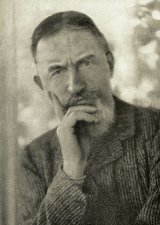Pygmalion Page #21
Pygmalion is a play by George Bernard Shaw, named after a Greek mythological figure. It was first presented on stage to the public in 1913. In ancient Greek mythology, Pygmalion fell in love with one of his sculptures, which then came to life.
PICKERING [much alarmed] Oh! but you're coming back to Wimpole Street, aren't you? You'll forgive Higgins? HIGGINS [rising] Forgive! Will she, by George! Let her go. Let her find out how she can get on without us. She will relapse into the gutter in three weeks without me at her elbow. Doolittle appears at the centre window. With a look of dignified reproach at Higgins, he comes slowly and silently to his daughter, who, with her back to the window, is unconscious of his approach. PICKERING. He's incorrigible, Eliza. You won't relapse, will you? LIZA. No: Not now. Never again. I have learnt my lesson. I don't believe I could utter one of the old sounds if I tried. [Doolittle touches her on her left shoulder. She drops her work, losing her self-possession utterly at the spectacle of her father's splendor] A--a--a--a--a--ah--ow--ooh! HIGGINS [with a crow of triumph] Aha! Just so. A--a--a--a--ahowooh! A--a--a--a--ahowooh ! A--a--a--a--ahowooh! Victory! Victory! [He throws himself on the divan, folding his arms, and spraddling arrogantly]. DOOLITTLE. Can you blame the girl? Don't look at me like that, Eliza. It ain't my fault. I've come into money. LIZA. You must have touched a millionaire this time, dad. DOOLITTLE. I have. But I'm dressed something special today. I'm going to St. George's, Hanover Square. Your stepmother is going to marry me. LIZA [angrily] You're going to let yourself down to marry that low common woman! PICKERING [quietly] He ought to, Eliza. [To Doolittle] Why has she changed her mind? DOOLITTLE [sadly] Intimidated, Governor. Intimidated. Middle class morality claims its victim. Won't you put on your hat, Liza, and come and see me turned off? LIZA. If the Colonel says I must, I--I'll [almost sobbing] I'll demean myself. And get insulted for my pains, like enough. DOOLITTLE. Don't be afraid: she never comes to words with anyone now, poor woman! respectability has broke all the spirit out of her. PICKERING [squeezing Eliza's elbow gently] Be kind to them, Eliza. Make the best of it. LIZA [forcing a little smile for him through her vexation] Oh well, just to show there's no ill feeling. I'll be back in a moment. [She goes out]. DOOLITTLE [sitting down beside Pickering] I feel uncommon nervous about the ceremony, Colonel. I wish you'd come and see me through it. PICKERING. But you've been through it before, man. You were married to Eliza's mother. DOOLITTLE. Who told you that, Colonel? PICKERING. Well, nobody told me. But I concluded naturally-- DOOLITTLE. No: that ain't the natural way, Colonel: it's only the middle class way. My way was always the undeserving way. But don't say nothing to Eliza. She don't know: I always had a delicacy about telling her. PICKERING. Quite right. We'll leave it so, if you don't mind. DOOLITTLE. And you'll come to the church, Colonel, and put me through straight? PICKERING. With pleasure. As far as a bachelor can. MRS. HIGGINS. May I come, Mr. Doolittle? I should be very sorry to miss your wedding. DOOLITTLE. I should indeed be honored by your condescension, ma'am; and my poor old woman would take it as a tremenjous compliment. She's been very low, thinking of the happy days that are no more. MRS. HIGGINS [rising] I'll order the carriage and get ready. [The men rise, except Higgins]. I shan't be more than fifteen minutes. [As she goes to the door Eliza comes in, hatted and buttoning her gloves]. I'm going to the church to see your father married, Eliza. You had better come in the brougham with me. Colonel Pickering can go on with the bridegroom. Mrs. Higgins goes out. Eliza comes to the middle of the room between the centre window and the ottoman. Pickering joins her. DOOLITTLE. Bridegroom! What a word! It makes a man realize his position, somehow. [He takes up his hat and goes towards the door]. PICKERING. Before I go, Eliza, do forgive him and come back to us. LIZA. I don't think papa would allow me. Would you, dad? DOOLITTLE [sad but magnanimous] They played you off very cunning, Eliza, them two sportsmen. If it had been only one of them, you could have nailed him. But you see, there was two; and one of them chaperoned the other, as you might say. [To Pickering] It was artful of you, Colonel; but I bear no malice: I should have done the same myself. I been the victim of one woman after another all my life; and I don't grudge you two getting the better of Eliza. I shan't interfere. It's time for us to go, Colonel. So long, Henry. See you in St. George's, Eliza. [He goes out]. PICKERING [coaxing] Do stay with us, Eliza. [He follows Doolittle]. Eliza goes out on the balcony to avoid being alone with Higgins. He rises and joins her there. She immediately comes back into the room and makes for the door; but he goes along the balcony quickly and gets his back to the door before she reaches it. HIGGINS. Well, Eliza, you've had a bit of your own back, as you call it. Have you had enough? and are you going to be reasonable? Or do you want any more? LIZA. You want me back only to pick up your slippers and put up with your tempers and fetch and carry for you. HIGGINS. I haven't said I wanted you back at all. LIZA. Oh, indeed. Then what are we talking about? HIGGINS. About you, not about me. If you come back I shall treat you just as I have always treated you. I can't change my nature; and I don't intend to change my manners. My manners are exactly the same as Colonel Pickering's. LIZA. That's not true. He treats a flower girl as if she was a duchess. HIGGINS. And I treat a duchess as if she was a flower girl. LIZA. I see. [She turns away composedly, and sits on the ottoman, facing the window]. The same to everybody. HIGGINS. Just so. LIZA. Like father. HIGGINS [grinning, a little taken down] Without accepting the comparison at all points, Eliza, it's quite true that your father is not a snob, and that he will be quite at home in any station of life to which his eccentric destiny may call him. [Seriously] The great secret, Eliza, is not having bad manners or good manners or any other particular sort of manners, but having the same manner for all human souls: in short, behaving as if you were in Heaven, where there are no third-class carriages, and one soul is as good as another. LIZA. Amen. You are a born preacher. HIGGINS [irritated] The question is not whether I treat you rudely, but whether you ever heard me treat anyone else better. LIZA [with sudden sincerity] I don't care how you treat me. I don't mind your swearing at me. I don't mind a black eye: I've had one before this. But [standing up and facing him] I won't be passed over. HIGGINS. Then get out of my way; for I won't stop for you. You talk about me as if I were a motor bus. LIZA. So you are a motor bus: all bounce and go, and no consideration for anyone. But I can do without you: don't think I can't.
Translation
Translate and read this book in other languages:
Select another language:
- - Select -
- 简体中文 (Chinese - Simplified)
- 繁體中文 (Chinese - Traditional)
- Español (Spanish)
- Esperanto (Esperanto)
- 日本語 (Japanese)
- Português (Portuguese)
- Deutsch (German)
- العربية (Arabic)
- Français (French)
- Русский (Russian)
- ಕನ್ನಡ (Kannada)
- 한국어 (Korean)
- עברית (Hebrew)
- Gaeilge (Irish)
- Українська (Ukrainian)
- اردو (Urdu)
- Magyar (Hungarian)
- मानक हिन्दी (Hindi)
- Indonesia (Indonesian)
- Italiano (Italian)
- தமிழ் (Tamil)
- Türkçe (Turkish)
- తెలుగు (Telugu)
- ภาษาไทย (Thai)
- Tiếng Việt (Vietnamese)
- Čeština (Czech)
- Polski (Polish)
- Bahasa Indonesia (Indonesian)
- Românește (Romanian)
- Nederlands (Dutch)
- Ελληνικά (Greek)
- Latinum (Latin)
- Svenska (Swedish)
- Dansk (Danish)
- Suomi (Finnish)
- فارسی (Persian)
- ייִדיש (Yiddish)
- հայերեն (Armenian)
- Norsk (Norwegian)
- English (English)
Citation
Use the citation below to add this book to your bibliography:
Style:MLAChicagoAPA
"Pygmalion Books." Literature.com. STANDS4 LLC, 2025. Web. 11 Jan. 2025. <https://www.literature.com/book/pygmalion_78>.




Discuss this Pygmalion book with the community:
Report Comment
We're doing our best to make sure our content is useful, accurate and safe.
If by any chance you spot an inappropriate comment while navigating through our website please use this form to let us know, and we'll take care of it shortly.
Attachment
You need to be logged in to favorite.
Log In